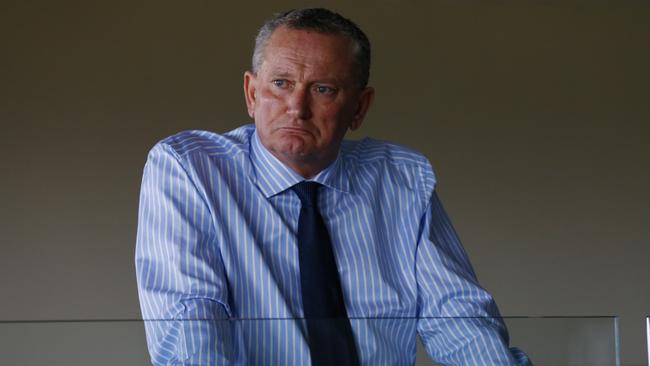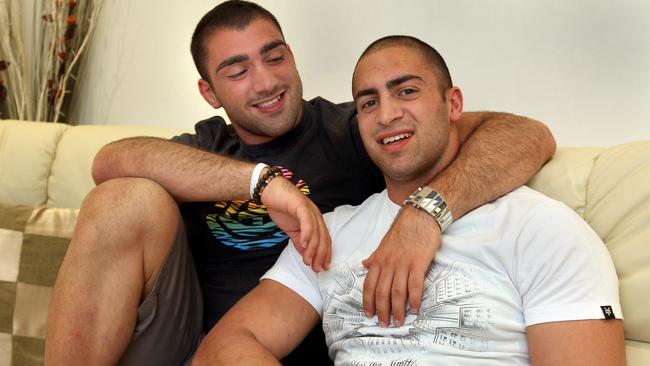Stephen Dank’s ‘indifference’ to Jon Mannah’s cancer shows why media was right to report the issue
STEPHEN Dank’s “reckless indifference” to Jon Mannah’s cancer was a tragedy. But the media’s reporting of it was fair and important, writes PAUL KENT.

NRL
Don't miss out on the headlines from NRL. Followed categories will be added to My News.
A GREAT stillness fell over rugby league on Tuesday. It was the frozen moment of a close call.
In the Supreme Court on Monday, a jury found that Stephen Dank, a name familiar to all of us, administered banned peptides CJC-1295 and GHRP-6 to NRL players.
He was found to have acted with “reckless indifference to (Jon) Mannah’s life by administering him with peptides while he was in remission for cancer”.
Jon Mannah, you will recall, was the Cronulla player diagnosed with Hodgkin’s lymphoma in 2009 who took a brief spell from the game to fight his illness.
He returned to play for Cronulla, including five games in 2011 when Dank was at the club, but suffered a relapse of his cancer and died in 2013.
By administering those peptides, the Court also found on Monday, Dank “accelerated Mannah’s death from cancer”.
The jury also found that Dank had administered dangerous and cancer causing supplements to Jon Mannah and other football players thereby exposing them to risk”.
Let’s be gentle here, but let’s be intelligent, too.
Dank sued The Daily Telegraph for defamation over the original publication of an article that linked Mannah’s death to peptides but lost on all counts on that article.
Forced to testify for the first time since the “blackest day in sport” scandal broke in 2013 _ Dank refused interview requests from the Australian Sports Anti-Doping Agency and the NRL and AFL on the way through — Dank was hammered in the Supreme Court.

Dank told the court he informed Cronulla the supplements, including peptides CJC-1295 and GHRP 6, were legal. He denied saying “that they would help rebuild cells”. Instead, he told the court the peptides were safe to use.
As much of the game absorbed the Supreme Court’s finding it also had to deal with its part in a tragedy.
Jon Mannah might have lived longer, at the very least, if he was not given peptides he was told were safe to use. That was and always should have been the issue.
Looking back, it appears the players misunderstood. They saw it as an attack on Mannah, which was a wrong assumption.
As such, and somewhat disturbingly, we allowed ourselves to be sidetracked into another argument altogether.
It was highly emotive but completely irrelevant given what was at stake. Yet such was the venom at the time any attempt to properly articulate the issue was quickly shot down.
Also overlooked in the reporting of the Mannah story was the strong expert medical opinion explaining the dangers of Dank’s supplements program. The misunderstanding can be forgiven for the players. It’s not their job.
It can’t be forgiven from the Rugby League Players Association or the NRL, who facilitated the arguments. Instead of calming the rage, they saw it as an opportunity.
For the RLPA, it was relevance. It used the story as an opportunity to push back on the coverage of the game on behalf of the players.
For the NRL, it was a closer bond between game and player.
Australian captain Cameron Smith spoke to then NRL chief executive Dave Smith about revoking the reporters’ media credentials and Smith actually considered it. He criticised the coverage. Each appeared so driven by their agenda not a word of reason or gentle commonsense was heard.

Because who, just once, raised the issued of player welfare? And wasn’t that the real issue?
I know Ben Ikin, sitting next to me on NRL360, did. But who else?
Unfortunately, when the articles were originally published, many who should have known better immediately jumped to outrage.
The only point that should have been taken from the story was the fact that these peptides could actually accelerate the growth of cancerous cells.
Surely it was the most important point of all.
If peptides promoted the cell growth of Mannah’s cancer, as the Court found this week, wasn’t that what should have been extracted from the conversation?
Yet overwhelmingly the NRL and RLPA ignored this to focus on whether the reporting of it was fair, completely misunderstanding and thereby dismissing the claims of public interest as the right to publish.
The RLPA interpreted this as a claim it was in the public interest that everyone had a right to know how Mannah died instead of the wider public interest that everybody had a right to know that by using such peptides they might inadvertently be accelerating an undiagnosed cancer inside them.
The NRL just wanted to be popular with the players.
The reporting was fair for that reason, which must never be forgotten.
Everybody taking the substances had a right to know it was not all upside. One tragedy was enough.





